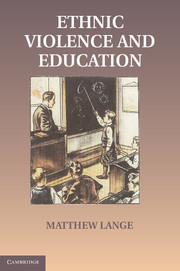Book contents
- Frontmatter
- Contents
- Figures
- Tables
- Acknowledgments
- 1 Introduction
- 2 Education and Ethnic Violence
- 3 Testing the Impact of Education on Ethnic Violence
- 4 Education and Ethnic Violence in Sri Lanka
- 5 Education and Ethnic Violence in Cyprus
- 6 Education and Ethnic Violence in the Palestinian Territories, India, and Sub-Saharan Africa
- 7 Education and Ethno-Nationalist Conflict in Canada and Germany
- 8 Education and Ethnic Violence
- Bibliography
- Index
2 - Education and Ethnic Violence
A Theoretical Framework
Published online by Cambridge University Press: 05 June 2012
- Frontmatter
- Contents
- Figures
- Tables
- Acknowledgments
- 1 Introduction
- 2 Education and Ethnic Violence
- 3 Testing the Impact of Education on Ethnic Violence
- 4 Education and Ethnic Violence in Sri Lanka
- 5 Education and Ethnic Violence in Cyprus
- 6 Education and Ethnic Violence in the Palestinian Territories, India, and Sub-Saharan Africa
- 7 Education and Ethno-Nationalist Conflict in Canada and Germany
- 8 Education and Ethnic Violence
- Bibliography
- Index
Summary
All major theories of ethnic violence provide insight that is simultaneously limited and valuable. Each theory is limited because ethnic violence is so complex: it depends on the particular context and sequence of events; any number of factors can spark it; and the perpetrators of ethnic violence are all motivated by different combinations of grievances, aspirations, interests, obligations, and pressures. Because of this very complexity, however, multiple theoretical perspectives are able to simultaneously offer insight into ethnic violence, making them all valuable.
Noting the value and limitations of theories of ethnic violence, the goal of this chapter is not to construct a general theory of ethnic violence. Instead, I construct a more focused framework that considers how education affects ethnic violence. For this, I note mechanisms from a variety of theories, consider how the mechanisms affect one another, and explore scope conditions on which the mechanisms depend. This mid-range theoretical approach follows recent claims by diverse social scientists that theory is most useful when it explores mechanisms and scope conditions instead of covering laws (George and Bennett 2005; Hedstrom and Swedberg 1998; Rueschemeyer 2009; Tilly 2001). Before turning to the theoretical framework, however, it is instructive to first consider the two complex concepts that are its focus: ethnic violence and education.
- Type
- Chapter
- Information
- Educations in Ethnic ViolenceIdentity, Educational Bubbles, and Resource Mobilization, pp. 12 - 34Publisher: Cambridge University PressPrint publication year: 2011



